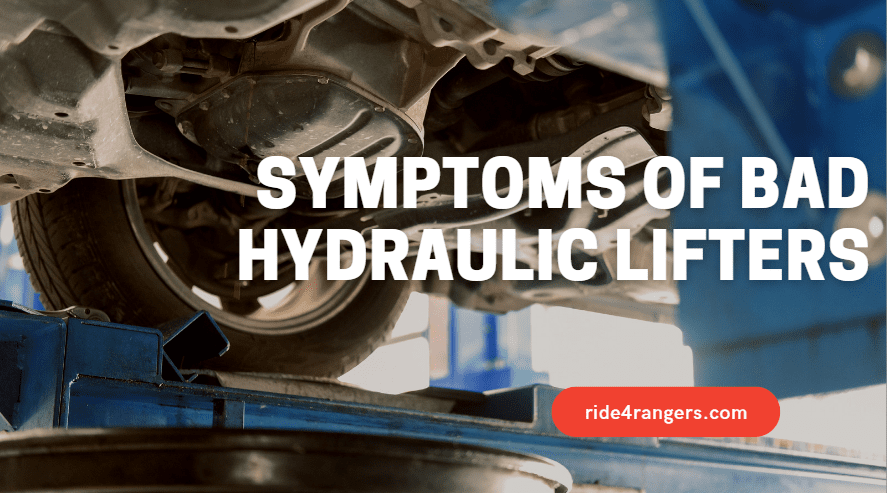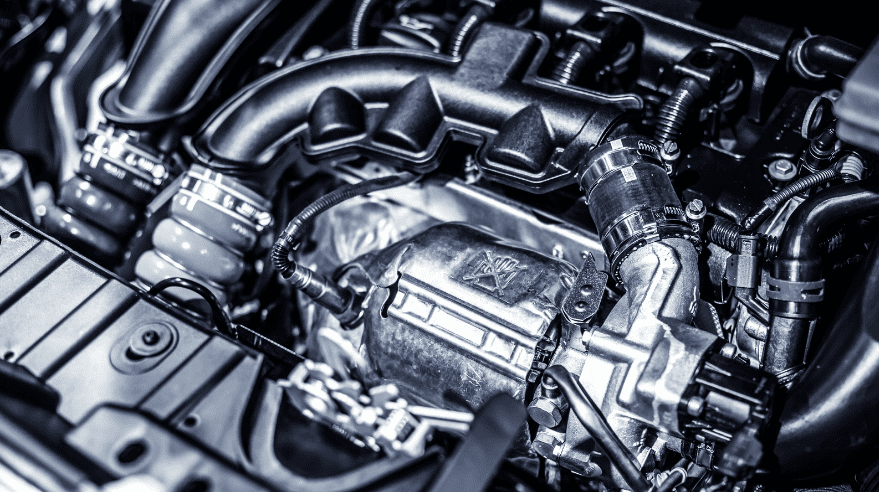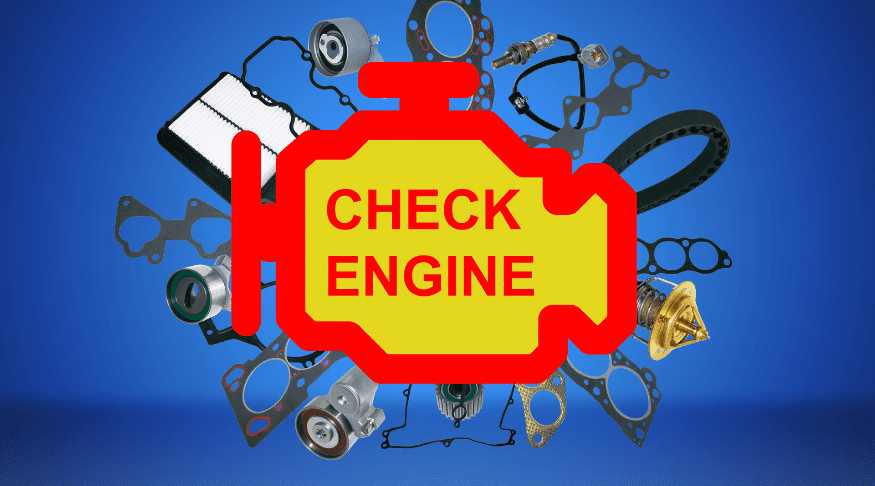A hydraulic lifter is a small mechanical device that helps to push up or pull down a load. It is commonly used in automobiles, but can also be found in other machinery such as construction equipment and elevators.
The main function of a hydraulic lifter is to provide a smooth, consistent motion while lifting or lowering a heavy object.
However, if the lifter is not properly maintained, it can begin to experience problems.
In this blog post, we will explore six symptoms of bad hydraulic lifters and their causes. We will also provide solutions for each problem so that you can keep your machinery running smoothly.
Cars and trucks with failed hydraulic lifter-equipped engines often suffer from low engine performance at idle or while accelerating. This will show up as a Check Engine Light on your dashboard and is usually accompanied by engine noise that grows louder as the car’s speed increases.
Hydraulic lifters are relatively technical parts that aid suspension when you’re driving — and they can break. Worse still, they’re often hidden under the car and can go undetected when they fail.
Symptoms Of Bad Hydraulic Lifters – Troubleshoot And Diagnosis

n We will explore symptoms of bad hydraulic lifters and what you can do to fix them. If you notice any of these symptoms in your own car, be sure to take it to a mechanic as soon as possible to prevent further damage.
1. Excessive Noise From Engine
If your engine is making more noise than usual, it could be a sign of bad hydraulic lifters. Hydraulic lifters are an important part of your engine’s valve train, and they help to keep the valves properly adjusted.
If they become worn or damaged, they can cause the valves to become misaligned, which can lead to increased engine noise.
There are a few different ways to tell if your hydraulic lifters are going bad. First, you may notice that your engine sounds louder than usual. This is especially apparent when you first start the engine up after it’s been sitting for a while. Additionally, you may notice that your engine idles Roughly, or that it has a tendency to stall.
When one of your vehicle’s hydraulic valve lifters is stuck or broken, it may cause a persistent noise. As you accelerate the vehicle and increase RPM, this noise will grow louder until a point where the valve can finally close.
If you think you may have bad hydraulic lifters, there are a few things you can do to check them. First, you can check the oil level in your engine. If it’s low, that could be a sign that the lifters are not being lubricated properly.
Additionally, you can remove the valve cover and visually inspect the lifters. If they appear to be damaged or excessively worn, they will need to be replaced.
2. Engine Stalls
If your engine stalls frequently, it could be a sign of bad hydraulic lifters. In addition to causing your engine to stall, bad hydraulic lifters can also cause it to run roughly or misfire.

If you suspect that your engine has bad hydraulic lifters, have a mechanic check it out as soon as possible.
Over time, your car’s hydraulic valve lifter will wear out. Hydraulic valve lifters control the opening and closing of the airflow valves in the engine. This allows air to pass into the engine when it is needed, and keep air from passing through when its place isn’t needed.
When a hydraulic valve lifter fails, your vehicle will produce misfires, which means that your vehicle won’t be able to function at its peak performance. This can further cause issues with other parts of your vehicle — like its transmission or cylinder heads — but it’s important to have any kind of problems fixed as soon as possible before your entire engine is affected.
3. Poor Fuel Economy
One of the main symptoms of bad hydraulic lifters is poor fuel economy. If your vehicle’s engine is not running as efficiently as it should be, it will use more fuel than necessary to power itself. This can lead to an increase in your monthly fuel bill, as well as decreased performance from your vehicle.
If you suspect that your hydraulic lifters are causing poor fuel economy, there are a few things you can do to diagnose the problem. First, check your engine’s oil level and quality.
If the oil is dirty or low, it could be causing the lifters to stick and prevent them from working properly. You should also look for any leaks in the hydraulic system. A leak can cause the fluid to lose pressure, which can make the lifters less effective.
Once you’ve diagnosed the problem, there are a few different ways to solve it. The most common solution is to simply replace the faulty lifter with a new one.
However, if the problem is caused by a leak, you’ll need to repair or replace the leaking component. In some cases, it may be necessary to replace the entire hydraulic system.
4. Broken Pushrods and Dead Cylinders
An overhead valve (OHV) engine has pushrods that connect the camshaft with the intake or exhaust valves. In an OHV engine, hydraulic lifters pump oil to your valves, reducing engine wear and noise.
The hydraulic lifter in an overhead valve engine is what can fail first — but making a car hot and idling it, accelerates this failure.
One of the most common reasons behind a bent pushrod is that it has been subjected to several extreme pressures over time. Hydraulic cylinders absorb the impact of these pressures, and with repeated use, they tend to wear down or even break. This can create pressure points on the pushrods that then bend them out of shape.
Check here to find fix for oil in spark plug threads
The pushrods connecting the valves to the cylinder will become bent or broken when the cylinder is bent, which means that you won’t just have a faulty drive valve — you’ll have one that isn’t working at all. When your hydraulic lift stops working entirely, it’s called a dead cylinder, and you’ll immediately notice a significant performance drop.
Aside from losing horsepower, a damaged engine will also sound worse. With fewer cylinders making noise, your engine sounds clunkier than it normally would. However, it’s not just a matter of sound; having a dead cylinder means that you’re putting additional stress on the remaining good cylinders — and that could mean further damage to your vehicle.
Depending on the cause and potential damage to other engine parts, it’s essential that you get your issue checked out as soon as possible.
5. Check the Engine Light
The check engine light is an incredibly powerful communication tool for motorists. The modern iteration of the check engine light alerts drivers to several different vehicle malfunctions without having to visit mechanics.

When a component in your vehicle isn’t functioning properly, the check engine light activates as a safety measure and communicates that issue with you instantly.
A faulty lifter can cause multiple problems on your dashboard. A defective one will most likely trigger the check engine light, which is an indication that something is wrong with the combustion process.
6. Sticky Lifters
When the lifter doesn’t move, the oil pressure will become unstable and eventually lack enough pressure to apply the desired force.
This will make it impossible to keep the lifter moving, which is then forced to hit other parts inside of it.
How To Fix A Bad Lifter?
The ticking or clattering noise in a car’s engine is typically caused by worn-out oil lifters. Since there are several possible causes of the malfunction, there are several ways to fix it.
1. Change Motor Oil
A responsible car owner should always take advantage of regular maintenance culture. Car engines are finicky and you need to keep a tab on the motor oil regularly. By not doing so, you could cause sludge buildup that will increase the noise intensity from the lifter and even lead to premature failure.
Change your engine oil every 1,000 miles (or as recommended by the manufacturer) to ensure the life of your engine and its durability. The best way to make sure you are using the right viscosity of oil for your vehicle is by consulting a trusted provider like Shell Motor Fuels.
2. Use Cleaning Additives
Bad car lifters can create a very significant impact on a vehicle’s performance. Even something as minor as a faulty push rod will damage an engine and make it run poorly.
To fix this problem, check the engine oil and add anything with high-performance hydraulic lifter additives while changing the oil.
3. Replace the lifter
No one likes the sound of a sticking lifter, but it’s just part of engine life. Usually, the repair is simply replacing that bad lifter with a new one (unless your service technician finds more problems in your engine).
But changing out the entire assembly may not be necessary — especially for older engines. A solid lifter may work as well as newer hydraulic lifters, but you’ll need to get rid of any clearance between the valves and pushrods.
Hydraulic Lifter Replacement Cost
When one of the eight lifters in your car’s brake system fails, it can cost you approximately $200 to $1,300 including part and labor costs.
A single hydraulic lifter costs $5 to $35, while labor costs vary from $100 to more than $1,000 depending on the car model.
Hydraulic lifter failures are totally avoidable with regular maintenance, but replacement is expensive. For example, it only costs between $5 and $30 to buy a new hydraulic lifter from the dealership, but your mechanic will charge you $200 or more for installation (and even more for diagnostics). Each of your engine’s parts costs money, so replacing them all at once is important — whether it’s easy to do or not.
Your vehicle’s engine has anywhere from eight to twenty-four lifters, and replacing them can cost a lot depending on which car you own. Average replacement pricing for all cars is $500 -$800, but it can range from $300 to $1,700.
Conclusion
If your hydraulic lifters are going bad, it’s important to catch the problem early so that you can avoid more serious engine damage. Pay attention to these six symptoms of bad hydraulic lifters and address the problem as soon as possible.
With a little preventative maintenance, you can keep your engine running smoothly for years to come.
Tim Hayden is a seasoned car mechanic and expert with a wealth of experience in the automotive industry.
With a deep passion for cars and a knack for solving complex mechanical issues, Tim is dedicated to providing valuable insights and practical tips to car owners.
Trust his expertise to keep your vehicle running smoothly.